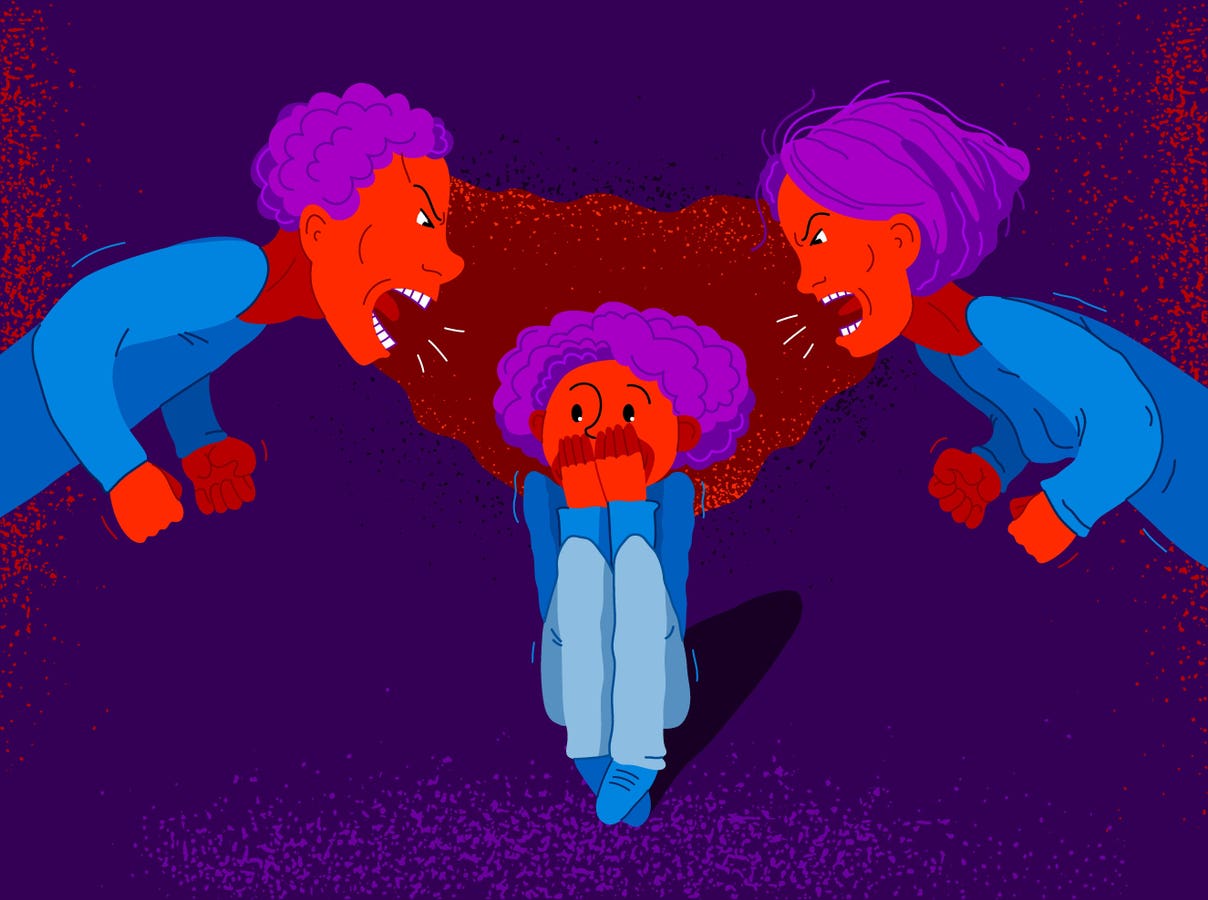You can care for your parents and still prioritize yourself, particularly when they hurt you … More
How often do you find yourself retelling an argument with a family member, struggling to make sense of the way they treated you?
You decide to open up to someone close in your life because you’re overwhelmed with emotions and you need to lighten your mental load. But you also feel guilty right after the conversation. To avoid giving your friend or partner the wrong impression about your family, you try to reduce the impact of your words by adding something like:
- “They mean well.”
- “They tried their best to raise us.”
- “Maybe I just don’t see it from their perspective.”
It’s almost as if we are trying to convince ourselves that we should stand by them because they’re family. Here are some things we commonly say to cover up our families’ wrongdoing even when it hurts us, and how we can reframe our perspective.
1. ‘But They Are Family’
This phrase might come up in friendly chats or therapy conversations. You start sharing how your family treated you and how hurt you feel, but then you pull back. You feel compelled to soften the blow, to justify their actions by saying how much they mean to you and that you don’t want to distance yourself — because they are family.
Some of us prioritize loyalty to our family over and above emotional safety and boundaries. It could be because we understand that they took care of us when we were children; when we didn’t know how to look after ourselves. But that does not mean all our emotional needs were met when we were kids.
As adults, we may carry remnants of our childhood by continuing to find ways, often impractical ones, to find or regain our self-worth. This could be by trying to please others, staying quiet or always helping around to feel safe or valued. These habits are called codependent traits and they help us survive emotionally as children.
Growing up with codependent traits does not make us inherently flawed, but if we want to accept ourselves as we are, we also have to come to terms with the fact that our parents may have failed us in some capacity.
But exactly how far are we willing to go to prove our loyalty to our blood ties? To explore this question, a 2020 study published in Memory & Cognition created practical moral dilemmas for participants to imagine, so they could check the extent of a family member’s loyalty to their kin.
Researchers asked participants to imagine witnessing their brother possibly doing something bad, like street battery. They found that family members will often bend facts to favor another family member, even in the face of their wrongdoing. This is a practice called “coherence shift” where our mind adjusts how we see things to make our beliefs, feelings and decisions line up.
Loyalty is a powerful force but it shouldn’t be an unquestionable one, here’s why:
- Firstly, people want to protect loved ones, so they unconsciously tweak the facts in a way to maintain mental coherence.
- Secondly, if you believe someone is a good person, you’re more likely to give them the benefit of the doubt, even when they do something wrong.
In the long run, constantly justifying the behavior of those who hurt or mistreat us can drain us emotionally. Instead of using the “but” statement, try to rephrase it with an “and” statement like “I can love them and recognize their behavior hurt me.” You can respect and love your family, while also loving yourself.
2. ‘They Wanted The Best For Me’
As children, we see our parents as God-like beings who could do no wrong because we lack the mental faculties it takes to understand that our parents are, in fact, fallible. It’s only when we grow up that we realize that our parents are not as perfect as we may have made them out to be.
Despite our resentment toward them, we try to view them from a place of understanding and empathy, which can, counterintuitively, minimize your family’s damaging or controlling behavior.
This kind of justification often shows up in areas like academics, marriage or career paths. We say “They wanted the best for me” to rationalize the pressure we have on us, but it eventually leaves us burnt out and disconnected from our own sense of purpose.
“Filial piety,” or the deep cultural expectation that children must respect, obey and serve their parents, is often seen as a virtue. But when that respect is one-sided, it can blur boundaries.
A 2020 study published in the Journal of Interpersonal Violence found that children who were expected to submit to and be obedient to their parents, especially ones who did so out of fear rather than love or respect, were more likely to engage in cyber-bullying. This could stem from their inability to stand up to themselves at home, and instead lash out at others to regain a sense of personal control.
Some families expect children to take responsibility in maintaining harmony, even if their parents are the ones behaving unreasonably. But clearly, these behaviors can have adverse consequences.
This is why you need to change your understanding of what your parents truly want. They may have wanted the best for you, but that may not have led to the best possible outcomes. You can balance out your perspective, by saying: “Their intentions might have been good, but the impact still caused harm.”
3. ‘They Did Not Mean It’
There could be many different ways you say this. Perhaps, you say, “They had a rough childhood” or “They were just stressed.” Despite the choice of words, what you’re ultimately trying to do is switch to an objective stance to possibly circumvent the emotions coming up for you — a classic case of intellectualizing emotions.
On one hand, understanding that they did their best at parenting us with the resources they had available is important. But on the other hand, that doesn’t mean we have to excuse or accept behavior that was hurtful or damaging. Recognizing their limitations doesn’t erase the impact their actions had on us.
Research published in Educational Philosophy and Theory suggests that when we learn that the person who hurt us is also suffering, we start to see them not as morally blameworthy, but as someone who needs help.
This creates a tension between excusing and exempting abuse. We excuse their behavior when we think the harm was unintentional or based on ignorance. But when we exempt them, we think the person isn’t fully responsible due to a deeper condition like severe trauma or mental illness.
In this case, we try to shift our mindset from blame to compassion, but that doesn’t mean we forget or accept the harm done.
We need to remind ourselves that understanding does not require us to tolerate or excuse the harm they’ve inflicted on us. If the person is currently capable of making choices and understanding right from wrong, they’re still responsible for their actions, regardless of the past.
Setting boundaries is, therefore, necessary no matter how guilty and regretful we feel. They’re still your family, they still may want the best for you and they may have had difficult lives that led them to act in damaging ways due to lapses in judgment.
But if they harmed us, especially over and over, that harm is real and it matters. You can feel compassion for their suffering and set boundaries to protect yourself.
Understanding where someone comes from is not the same as excusing what they did. You deserve safety and healing, no matter what kind of pain shaped the people who raised you.
Did you have to take on the role of a parent as a child? Take this science-backed test to find out: Parentification Scale.








